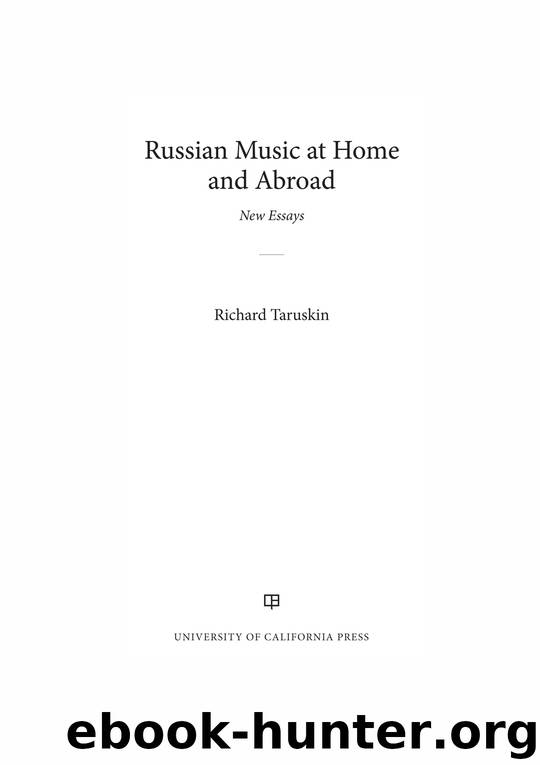Russian Music at Home and Abroad by Taruskin Richard

Author:Taruskin, Richard
Language: eng
Format: epub
ISBN: 9780520288089
Publisher: University of California Press
8. MNOGO PESEN POYOT NASH SOVETSKIY NAROD
Before hearing the duck quack, a short, somewhat achronological excursus may be in order on the now often forgotten Khrushchev, who saw it as his task—having succeeded Stalin to the pinnacle of power and having exposed his predecessor’s crimes at the Twentieth Party Congress in 1956—to at last define Soviet nationhood, or at least define the term sovetskiy narod (the Soviet people), which his own 1939 article had helped popularize.93 It was a difficult term to define, because it embodied a typically unacknowledged contradiction. Like “nation,” which derives from the Latin natio, itself a derivative of natus, the past participle of nasci (to be born), the word “people” has a biological implication: the -rod in narod is the exact equivalent of natio, with a similar range of meaning (“birth, origin, stock,” according to one dictionary)94 and a similar connection with the cognate verb rodit’ (to sire, beget) and its imperfective alternate rozhat’ (to bear, give birth). Only ethnicity, not statehood, correlates with biology: a wholly secular, wholly political entity like the Soviet Union (or the United States for that matter, where the issue is also frequently beclouded) cannot, strictly speaking, be a nation or a narod, only a politically designated territory with a population or citizenry. This limitation would seem to apply even more decisively to a state that is defined, as the Soviet Union certainly was, as multinational.
Eppur si muove! Both the USA and the USSR, and every other modern state, did indeed describe or conceive of itself, at various times and for various reasons, as a nation, and as a people (“the American people” being the entity that American politicians always claim to represent, and to which they appeal for support). Their different means of resolving the contradictions are often telling. The term sovetskiy narod had been in use in the Soviet Union as early as the 1920s.95 By the time of the Friendship of Peoples campaign it was the common coin of Soviet propaganda, as in the very popular “Pesnya o Staline” (Song about Stalin: words by Sergey Alïmov, music by Alexander Alexandrov, 1937), whose first quatrain goes “Mnogo pesen poyot nash Sovetskiy Narod,/Nad polyami, lesami gustïmi./V kazhdoy pesne zvuchit, v kazhdoy pesne zhivyot/Vsenarodonoye Stalina imya” (Our Soviet People sings many songs/over fields, over thick woods./In every song resounds, in every song there lives/the omninational name of Stalin).96 By the 1940s, it was well established in patriotic literature, as witness the texts submitted in competition for setting to Alexandrov’s existing melody for the new state anthem in 1943,97 not to mention slogans like the ubiquitous postwar “Slava sovetskomu narodu-pobeditlyu!” (Glory to the victorious Soviet people!).98
Perhaps most relevant, however, was the fact that even before it took power the Bolshevik Party had been calling its opponents vrag naroda (“enemy of the people”), a phrase derived, like so much Leninist rhetoric, from the vocabulary of the French revolution, ennemi du peuple being the term the Jacobins applied to those condemned during the Terror.
Download
This site does not store any files on its server. We only index and link to content provided by other sites. Please contact the content providers to delete copyright contents if any and email us, we'll remove relevant links or contents immediately.
The Art of Boudoir Photography: How to Create Stunning Photographs of Women by Christa Meola(18612)
Red Sparrow by Jason Matthews(5465)
Harry Potter 02 & The Chamber Of Secrets (Illustrated) by J.K. Rowling(3665)
In a Sunburned Country by Bill Bryson(3536)
Drawing Cutting Edge Anatomy by Christopher Hart(3520)
Figure Drawing for Artists by Steve Huston(3442)
Harry Potter and the Prisoner of Azkaban (Book 3) by J. K. Rowling(3346)
The Daily Stoic by Holiday Ryan & Hanselman Stephen(3299)
Japanese Design by Patricia J. Graham(3163)
Make Comics Like the Pros by Greg Pak(2909)
The Roots of Romanticism (Second Edition) by Berlin Isaiah Hardy Henry Gray John(2905)
Stacked Decks by The Rotenberg Collection(2879)
Harry Potter and the Deathly Hallows (7) by J.K. Rowling(2714)
Draw-A-Saurus by James Silvani(2711)
Tattoo Art by Doralba Picerno(2659)
On Photography by Susan Sontag(2631)
Churchill by Paul Johnson(2577)
The Daily Stoic by Ryan Holiday & Stephen Hanselman(2566)
Drawing and Painting Birds by Tim Wootton(2507)
